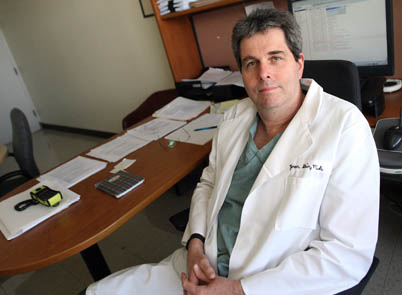The paradox of pain

Dr Yoram Shir wants diet to become part of the anti-pain arsenal.
Owen Egan
Ask Dr Yoram Shir about pain and he'll tell you about the pounding headaches he gets when he eats burnt potato chips. He sees this surprising food-pain association in his work at the MUHC Pain Centre, too: several of his patients experience intense facial pain and headaches after eating raw onions or chili peppers.
Links between diet and health issues like cardiovascular disease and depression are well known; Shir believes a similar link also exists between diet and pain.
His research has shown that diet can play a role in preventing long-term pain as well.
Most of the time, pain recedes as an injury heals. But in a surprising number of cases, pain persists long after the damage has mended. Cases like these are impossible to treat using traditional methods that target the injury or illness that originally caused the pain. This challenge has lead modern pain researchers at the Alan Edwards Centre for Research on Pain at McGill to study pain itself, rather than the cause.
The MUHC Pain Centre, meanwhile, is dedicated to reducing patient pain using any means that work, from acupuncture to surgery to medication. Shir, the Centre's director, wants diet to become part of the anti-pain arsenal. His research group is testing the effects of protein supplements and dietary oils on pain response. They found that a diet including soy protein and omega-3 fatty acids reduces pain responses in rats, while canola oil increases pain.
Humans also feel the effect of diet on pain. A pilot study showed that dietary soy protein reduces pain in patients suffering from neuropathic pain, caused by nerve damage left behind after a short-term infection, like shingles, heals. According to Shir, soy may act by increasing the blood concentration of hormones that modulate pain detection in the central nervous system. In the coming months, Shir will launch a large-scale study to examine whether soy will prevent the onset of chronic pain in post-operative patients. "Maybe in 20 years...diet [will have] a central role in increasing or decreasing pain," Shir said.
In striking contrast to patients suffering from persistent pain, others have reduced pain or don't feel pain at all. Children with Fragile X syndrome, a form of mental impairment and autism caused by the lack of the Fmr1 gene, exhibit an abnormally reduced response to pain. When these children get scrapes and bruises they act as though they haven't been hurt. By studying rats that also lack Fmr1, Dr Fernando Cervero, Director of the Anesthesia Research Unit at McGill, determined that this gene is essential to relay pain signals to the brain. This finding established the first known link between Fmr1 and pain response. Sensory nerve cells normally receive a sensory stimulus at one end and send a signal to the spinal cord from the other end. Without Fmr1, this relay system fails. Nerve cells receive incoming pain signals, but cannot pass the information correctly to the spinal cord and the pain message never arrives at the brain. A child with Fragile X syndrome may fall and scrape his knee, but his brain can't tell that he's hurt.
While most of us try to avoid pain, we cannot ignore the importance of pain in alerting the brain to bodily injury. Researchers like Cervero and Shir are steadily unraveling the paradox of pain, hoping to reach a perfect balance, where we retain an essential awareness of injuries, and can enjoy potato chips, canola oil and onions, too.
From May 29 to June 4, McGill pain researchers will share their expertise with students from Africa and Latin America at the International Brain Research Organization (IBRO) Pain School, an interdisciplinary program aimed at improving the understanding, prevention and treatment of chronic pain.
See http://schools.ibro.info/Pub/Pub_Main_Display.asp?LC_Docs_ID=2832 for more information.
WARM-SPARK (Writing About Research at McGill-Students Promoting Awareness of Research Knowledge) is sponsored by the Faculty of Science, the Offices of the Vice-Principal (Research) and University Relations, NSERC, the Faculty of Engineering and the Faculty of Agricultural & Environmental Sciences. See www.spark.mcgill.ca for more information and articles.

